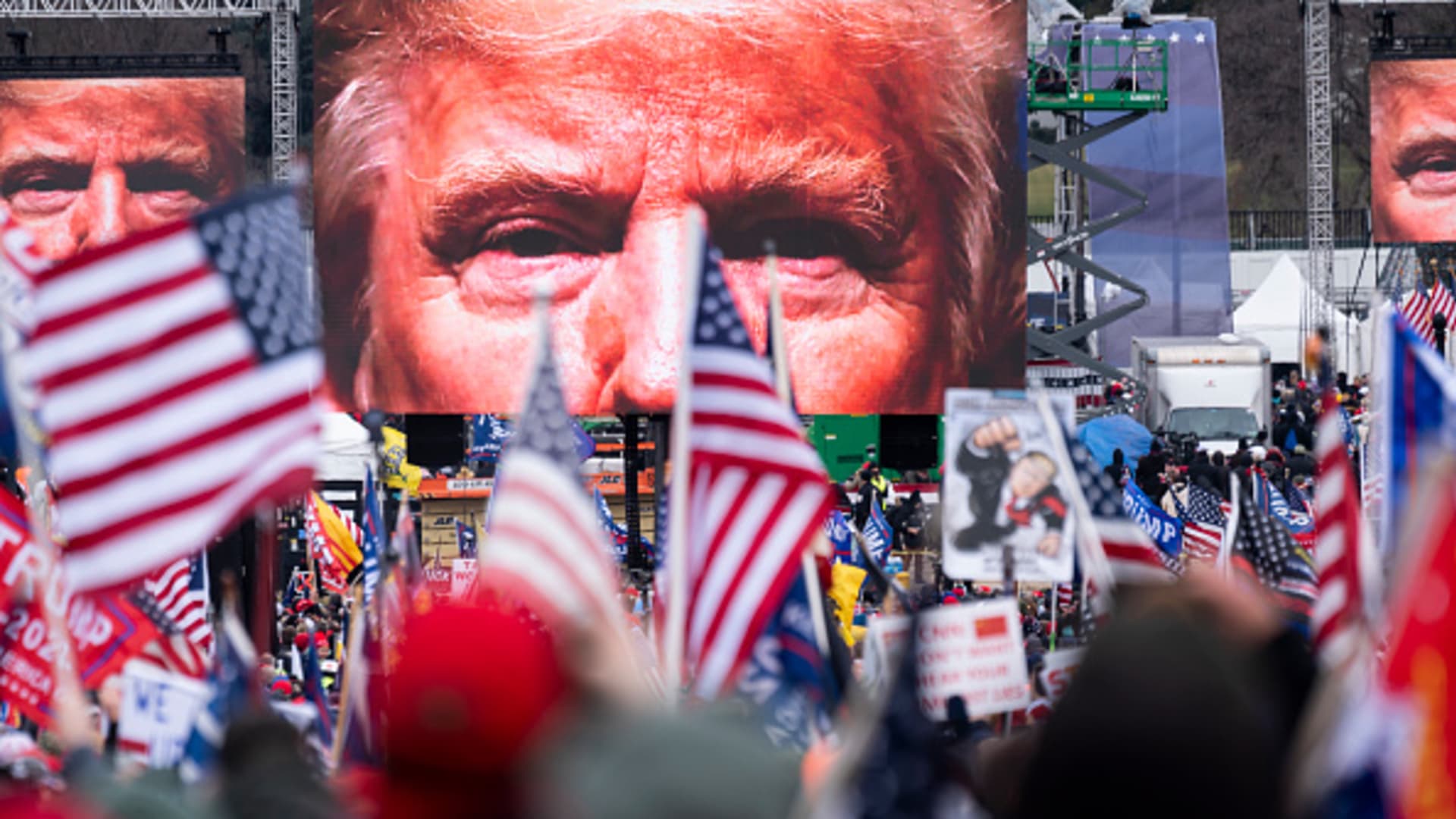Meta will allow former President Donald Trump to return to Facebook and Instagram in the coming weeks, the company announced, two years after his suspension was enacted following the 2021 insurrection at the U.S. Capitol.
“As a general rule, we don’t want to get in the way of open, public and democratic debate on Meta’s platforms — especially in the context of elections in democratic societies like the United States,” Nick Clegg, Meta’s president of global affairs, wrote in a blog post announcing the decision. “The public should be able to hear what their politicians are saying — the good, the bad and the ugly — so that they can make informed choices at the ballot box.”
Facebook, Twitter and Google-owned YouTube all made the unprecedented decision to block the sitting U.S. president from their platforms at the time, after they determined doing so outweighed the risk of potential further incitement to violence. The platforms’ moves varied in their degrees, however, with Twitter opting for a permanent ban and Facebook saying its suspension was temporary, eventually setting a timeline of two years before it reviewed the decision.
The suspensions came after a mob charged into the U.S. Capitol on Jan. 6, 2021, as lawmakers worked to certify the election of President Joe Biden. Then-Vice President Mike Pence was whisked away to a secure location by the Secret Service, recognizing the danger to him as he oversaw what’s usually a routine procedure in Congress.
Though Trump at one point urged the mob to remain peaceful, he also stoked the lie that the election was “stolen from us,” tweeting at one point during the day that Pence “didn’t have the courage to do what should have been done to protect our country and our Constitution,” presumably by obstructing the election results that denied Trump a second term.
“The suspension was an extraordinary decision taken in extraordinary circumstances,” Clegg wrote. “Now that the time period of the suspension has elapsed, the question is not whether we choose to reinstate Mr. Trump’s accounts, but whether there remain such extraordinary circumstances that extending the suspension beyond the original two-year period is justified.”
Clegg said in making the decision that Meta took into account conduct around last year’s midterm elections in the U.S. and expert assessments of the security environment. As a result, the company concluded “that the risk has sufficiently receded, and that we should therefore adhere to the two-year timeline we set out.”
Still, Clegg said Trump would be subject to “heightened penalties for repeat offenses,” which also apply to other public figures who are reinstated for civil unrest, under a newly updated protocol. If the former president violates Meta’s community guidelines again, the violating posts will be removed and he’ll be suspended anywhere from a month to two years, depending on the severity.
The updated protocol “addresses content that does not violate our Community Standards but that contributes to the sort of risk that materialized on January 6th, such as content that delegitimizes an upcoming election or is related to QAnon,” Clegg wrote. Meta may suppress distribution of such posts, and for repeated offenses temporarily limit access to Meta’s advertising tools. The company could also choose to remove the “reshare” button on posts that violate those guidelines or prevent them from being run as ads. Meta could take similar steps if Trump posted something that “violates the letter” of its community guidelines but that it deems newsworthy.
“We know that any decision we make on this issue will be fiercely criticized,” Clegg wrote. “Reasonable people will disagree over whether it is the right decision. But a decision had to be made, so we have tried to make it as best we can in a way that is consistent with our values and the process we established in response to the Oversight Board’s guidance.”
Setting the two-year suspension
Platforms like Facebook and Twitter earlier removed or labeled certain posts by the former president that they believed to be harmful before ultimately choosing to block his account.
On the evening of Jan. 6, 2021, Facebook said that “two policy violations” on Trump’s page would trigger a 24-hour block on its platforms. The next day, the company said in a statement that it felt “the risks of allowing President Trump to continue to use our service during this period are simply too great,” and said the ban would last “for at least the next two weeks,” through the inauguration.
On the day of Biden’s inauguration, the company said it was referring the suspension to its independent Oversight Board, which Facebook established to make binding content decisions. The Oversight Board said Facebook should set a timeline for reevaluating its decision, which Facebook determined in June 2021 should be two years from Trump’s Jan. 7, 2021, suspension.
The Oversight Board said it did not play a role in Meta’s decision, though the company told the group yesterday of their plans to reinstate Trump.
In a June 2021 blog post announcing the time frame, Clegg said the decision on whether to reinstate Trump’s account would be based on “whether the risk to public safety has receded,” accounting for “instances of violence, restrictions on peaceful assembly and other markers of civil unrest.”
Should Trump be allowed back onto the service, Clegg said at the time, there would be “a strict set of rapidly escalating sanctions that will be triggered if Mr. Trump commits further violations in future, up to and including permanent removal of his pages and accounts.”
Trump has since moved his musings to Truth Social, an app he’s backed that closely resembles Twitter and is led by Devin Nunes, the former California Republican congressman.
Twitter’s new owner, Elon Musk, lifted the platform’s suspension of Trump last year, though the former president has yet to resume tweeting from his account.
WATCH: House Minority Leader Kevin McCarthy recorded venting his opinions about Jan. 6

